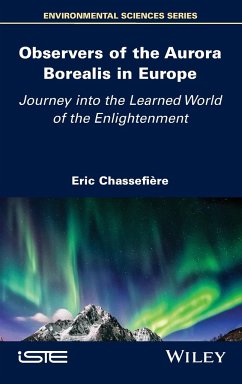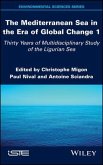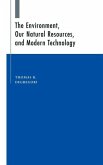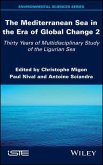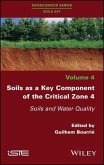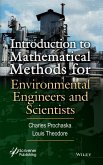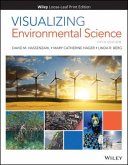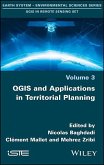Eric Chassefiere
Observers of the Aurora Borealis in Europe
Journey Into the Learned World of the Enlightenment
Eric Chassefiere
Observers of the Aurora Borealis in Europe
Journey Into the Learned World of the Enlightenment
- Gebundenes Buch
- Merkliste
- Auf die Merkliste
- Bewerten Bewerten
- Teilen
- Produkt teilen
- Produkterinnerung
- Produkterinnerung
The spectacular reappearance of the aurora borealis at the beginning of the 18th century, often observed simultaneously from different observatories in Europe, mobilized and federated a large community of astronomers on a European scale. It encouraged them to communicate the results of their observations and, in compiling exhaustive catalogs of information, has helped to establish a system of the aurora borealis that can be further studied in the future, according to the experimental method inherited from the previous century. This book is dedicated to some of the main aurora observers in…mehr
Andere Kunden interessierten sich auch für
![The Mediterranean Sea in the Era of Global Change 1 The Mediterranean Sea in the Era of Global Change 1]() The Mediterranean Sea in the Era of Global Change 1187,99 €
The Mediterranean Sea in the Era of Global Change 1187,99 €![The Environment, Our Natural Resources and Modern Technology The Environment, Our Natural Resources and Modern Technology]() Thomas R DegregoriThe Environment, Our Natural Resources and Modern Technology105,99 €
Thomas R DegregoriThe Environment, Our Natural Resources and Modern Technology105,99 €![The Mediterranean Sea in the Era of Global Change 2 The Mediterranean Sea in the Era of Global Change 2]() The Mediterranean Sea in the Era of Global Change 2192,99 €
The Mediterranean Sea in the Era of Global Change 2192,99 €![Soils as a Key Component of the Critical Zone 4 Soils as a Key Component of the Critical Zone 4]() Soils as a Key Component of the Critical Zone 4191,99 €
Soils as a Key Component of the Critical Zone 4191,99 €![Introduction to Mathematical Methods for Environmental Engineers and Scientists Introduction to Mathematical Methods for Environmental Engineers and Scientists]() Charles ProchaskaIntroduction to Mathematical Methods for Environmental Engineers and Scientists219,99 €
Charles ProchaskaIntroduction to Mathematical Methods for Environmental Engineers and Scientists219,99 €![Visualizing Environmental Science Visualizing Environmental Science]() David M HassenzahlVisualizing Environmental Science175,99 €
David M HassenzahlVisualizing Environmental Science175,99 €![Qgis and Applications in Territorial Planning Qgis and Applications in Territorial Planning]() Qgis and Applications in Territorial Planning202,99 €
Qgis and Applications in Territorial Planning202,99 €-
-
-
The spectacular reappearance of the aurora borealis at the beginning of the 18th century, often observed simultaneously from different observatories in Europe, mobilized and federated a large community of astronomers on a European scale. It encouraged them to communicate the results of their observations and, in compiling exhaustive catalogs of information, has helped to establish a system of the aurora borealis that can be further studied in the future, according to the experimental method inherited from the previous century. This book is dedicated to some of the main aurora observers in Europe and to the human, institutional and philosophical context in which they evolved in the first half of the 18th century. Its reading should be seen as a retrospective journey through the scholarly world of the Enlightenment, during which the same scholars are frequently encountered and reencountered, yet each time in different contexts, or from different angles, with the aim of compiling an account of the swarming of ideas and encounters that constituted the development of experimental science in this pivotal period.
Hinweis: Dieser Artikel kann nur an eine deutsche Lieferadresse ausgeliefert werden.
Hinweis: Dieser Artikel kann nur an eine deutsche Lieferadresse ausgeliefert werden.
Produktdetails
- Produktdetails
- Verlag: Wiley
- Seitenzahl: 368
- Erscheinungstermin: 15. August 2023
- Englisch
- Abmessung: 240mm x 161mm x 24mm
- Gewicht: 712g
- ISBN-13: 9781786307927
- ISBN-10: 1786307928
- Artikelnr.: 68214258
- Herstellerkennzeichnung
- Libri GmbH
- Europaallee 1
- 36244 Bad Hersfeld
- gpsr@libri.de
- Verlag: Wiley
- Seitenzahl: 368
- Erscheinungstermin: 15. August 2023
- Englisch
- Abmessung: 240mm x 161mm x 24mm
- Gewicht: 712g
- ISBN-13: 9781786307927
- ISBN-10: 1786307928
- Artikelnr.: 68214258
- Herstellerkennzeichnung
- Libri GmbH
- Europaallee 1
- 36244 Bad Hersfeld
- gpsr@libri.de
Eric Chassefière is a physicist and member of the History of Astronomical Sciences Team of SYRTE, Paris. Also Director of Research at CNRS in Paris, he is specialized in the study of planetary atmospheres. He has also taught the physics of the Earth and its atmosphere at the École Polytechnique, Paris.
Introduction ix
Chapter 1 The Aurora Borealis Issue of the Affirmation of the Cartesian
Mechanism and the Dispute Between Paris and Montpellier: The French Choice
1
1.1 Introduction 1
1.2 The two main systems of the aurora borealis 2
1.2.1 Halley's system 2
1.2.2 Mairan's system 5
1.3 History of the aurora borealis in the volumes of the Académie Royale
des Sciences between 1716 and 1733 8
1.3.1 The silence on Halley's system in Mémoires and Histoire 8
1.3.2. The memoir refused by the Parisian Academy of François de Plantade
.. 13
1.4 The Montpellier actors: François de Plantade and the Société Royale des
Sciences 20
1.4.1 François de Plantade, founder of the Société Royale de Montpellier 20
1.4.2 The Société Royale des Sciences de Montpellier 21
1.5 The Parisian actors: Bernard le Bovier de Fontenelle and Jean-Jacques
Dortous de Mairan, the Académie Royale des Sciences 26
1.5.1 The Académie Royale des Sciences 26
1.5.2 The permanent secretary Bernard le Bovier de Fontenelle 30
1.5.3 Jean-Jacques Dortous de Mairan 37
1.6 The London actors: Hans Sloane and Edmond Halley, the Royal Society 43
1.6.1 Hans Sloane 43
1.6.2 Edmond Halley 45
1.6.3 The Royal Society and its relations with the Académie Royale des
Sciences 49
1.7 Discussion of the reasons for rejecting Plantade's submission 51
Chapter 2 Joseph-Nicolas Delisle: Grandeur and Vicissitudes of a Newtonian
Scientist with Thwarted Ambitions 55
2.1 Introduction 55
2.2 Delisle in the period before his departure for Russia (1710-1725) 61
2.2.1 Delisle's beginnings in astronomy and optics, a Newtonian 61
2.2.2 Delisle's setbacks at the Académie Royale des Sciences 71
2.2.3 Delisle's great project: Histoire Céleste 83
2.2.4 Epilogue concerning the Parisian period 89
2.3 The invitation to St Petersburg and Delisle's Russian period
(1726-1747) 90
2.3.1 The cartographic objective of Delisle's mission 90
2.3.2 Delisle's means at the St Petersburg Observatory 97
2.4 Brief synthesis of Delisle's scientific trajectory 109
2.5 Conclusion 112
Chapter 3 The Creation Ex-nihilo and the Beginnings of the Imperial Russian
Academy of Sciences: The Influence of Christian Wolff 115
3.1 Introduction 115
3.2 The foundation of the Imperial Academy of Sciences in St Petersburg 117
3.2.1 Historical context 117
3.2.2 Peter the Great's Imperial Academy of Sciences project 120
3.2.3 The birth of astronomy in Russia 122
3.3 Christian Wolff, the aurora borealis and their first observers at the
Academy of Sciences in St Petersburg 125
3.3.1 Historical context 125
3.3.2 Christian Wolff's conference 126
3.3.3 The quartet of aurora observers at the Academy of Sciences of St
Petersburg 131
3.3.4 The rejection of aurora observations by Mayer 135
3.3.5 Euler's physical-mathematical explanation 143
3.3.6 Mayer's philosophical position and possible reasons for his
abandonment of aurora observation 146
3.4 The Imperial Academy of Sciences of St Petersburg 149
3.4.1 The setting up of the Academy 149
3.4.2 The clerical and noble opposition 151
3.4.3 Wolffians versus Newtonians 155
3.4.4. The problems of the functioning of the Academy in the decades
1730-1740 161
3.4.5 The regulation of 1748 refounding the Academy 164
3.5 Conclusion 167
Chapter 4 Anders Celsius and the European Observation Networks, Setting Up
a Science Society and an Astronomical Observatory in Uppsala 171
4.1 Introduction 171
4.2 The life of Celsius 173
4.2.1 The first years 173
4.2.2 The European journey 176
4.2.3 Maupertuis' expedition in Lapland 179
4.2.4 The last few years 181
4.3 Three European networks for the observation of natural phenomena 184
4.3.1 The observations of the aurora borealis around de Mairan 185
4.3.2 Monitoring the variations of the magnetic needle according to Anders
Celsius 190
4.3.3 Thermometry and meteorological records around Joseph-Nicolas Delisle
199
4.4 The Royal Society of Uppsala and Celsius' legacy 211
4.4.1 Historical context of the Enlightenment in Sweden 211
4.4.2 Birth and development of the Royal Society of Sciences in Uppsala 214
4.4.3 Relations between the Royal Society and the University 219
4.4.4 Celsius' legacy 222
4.5 Conclusion 228
Chapter 5 Genesis of the Academies of Bologna and Berlin, the Involvement
of Women in Astronomy and the Gender Issue 231
5.1 Introduction 231
5.2 Three examples of "astronomical households" 236
5.2.1. The Kirchs: an artisanal-type household inspired by the guild
tradition 238
5.2.2 The Manfredis: a household with a humanistic coloration inherited
from the Renaissance 247
5.2.3 The Delisle family: an artisanal household where women took care of
the family scientific heritage 255
5.3 Two examples of astronomical institutions: the academies of Bologna and
Berlin and their observatories 259
5.3.1 The Academy and the Bologna Observatory 262
5.3.2 The Academy and the Observatory of Berlin 270
5.4 Astronomical households, institutions and gender in Bologna and Berlin
280
5.5 Conclusion 287
Conclusion 289
Appendix 301
References 313
Index 331
Chapter 1 The Aurora Borealis Issue of the Affirmation of the Cartesian
Mechanism and the Dispute Between Paris and Montpellier: The French Choice
1
1.1 Introduction 1
1.2 The two main systems of the aurora borealis 2
1.2.1 Halley's system 2
1.2.2 Mairan's system 5
1.3 History of the aurora borealis in the volumes of the Académie Royale
des Sciences between 1716 and 1733 8
1.3.1 The silence on Halley's system in Mémoires and Histoire 8
1.3.2. The memoir refused by the Parisian Academy of François de Plantade
.. 13
1.4 The Montpellier actors: François de Plantade and the Société Royale des
Sciences 20
1.4.1 François de Plantade, founder of the Société Royale de Montpellier 20
1.4.2 The Société Royale des Sciences de Montpellier 21
1.5 The Parisian actors: Bernard le Bovier de Fontenelle and Jean-Jacques
Dortous de Mairan, the Académie Royale des Sciences 26
1.5.1 The Académie Royale des Sciences 26
1.5.2 The permanent secretary Bernard le Bovier de Fontenelle 30
1.5.3 Jean-Jacques Dortous de Mairan 37
1.6 The London actors: Hans Sloane and Edmond Halley, the Royal Society 43
1.6.1 Hans Sloane 43
1.6.2 Edmond Halley 45
1.6.3 The Royal Society and its relations with the Académie Royale des
Sciences 49
1.7 Discussion of the reasons for rejecting Plantade's submission 51
Chapter 2 Joseph-Nicolas Delisle: Grandeur and Vicissitudes of a Newtonian
Scientist with Thwarted Ambitions 55
2.1 Introduction 55
2.2 Delisle in the period before his departure for Russia (1710-1725) 61
2.2.1 Delisle's beginnings in astronomy and optics, a Newtonian 61
2.2.2 Delisle's setbacks at the Académie Royale des Sciences 71
2.2.3 Delisle's great project: Histoire Céleste 83
2.2.4 Epilogue concerning the Parisian period 89
2.3 The invitation to St Petersburg and Delisle's Russian period
(1726-1747) 90
2.3.1 The cartographic objective of Delisle's mission 90
2.3.2 Delisle's means at the St Petersburg Observatory 97
2.4 Brief synthesis of Delisle's scientific trajectory 109
2.5 Conclusion 112
Chapter 3 The Creation Ex-nihilo and the Beginnings of the Imperial Russian
Academy of Sciences: The Influence of Christian Wolff 115
3.1 Introduction 115
3.2 The foundation of the Imperial Academy of Sciences in St Petersburg 117
3.2.1 Historical context 117
3.2.2 Peter the Great's Imperial Academy of Sciences project 120
3.2.3 The birth of astronomy in Russia 122
3.3 Christian Wolff, the aurora borealis and their first observers at the
Academy of Sciences in St Petersburg 125
3.3.1 Historical context 125
3.3.2 Christian Wolff's conference 126
3.3.3 The quartet of aurora observers at the Academy of Sciences of St
Petersburg 131
3.3.4 The rejection of aurora observations by Mayer 135
3.3.5 Euler's physical-mathematical explanation 143
3.3.6 Mayer's philosophical position and possible reasons for his
abandonment of aurora observation 146
3.4 The Imperial Academy of Sciences of St Petersburg 149
3.4.1 The setting up of the Academy 149
3.4.2 The clerical and noble opposition 151
3.4.3 Wolffians versus Newtonians 155
3.4.4. The problems of the functioning of the Academy in the decades
1730-1740 161
3.4.5 The regulation of 1748 refounding the Academy 164
3.5 Conclusion 167
Chapter 4 Anders Celsius and the European Observation Networks, Setting Up
a Science Society and an Astronomical Observatory in Uppsala 171
4.1 Introduction 171
4.2 The life of Celsius 173
4.2.1 The first years 173
4.2.2 The European journey 176
4.2.3 Maupertuis' expedition in Lapland 179
4.2.4 The last few years 181
4.3 Three European networks for the observation of natural phenomena 184
4.3.1 The observations of the aurora borealis around de Mairan 185
4.3.2 Monitoring the variations of the magnetic needle according to Anders
Celsius 190
4.3.3 Thermometry and meteorological records around Joseph-Nicolas Delisle
199
4.4 The Royal Society of Uppsala and Celsius' legacy 211
4.4.1 Historical context of the Enlightenment in Sweden 211
4.4.2 Birth and development of the Royal Society of Sciences in Uppsala 214
4.4.3 Relations between the Royal Society and the University 219
4.4.4 Celsius' legacy 222
4.5 Conclusion 228
Chapter 5 Genesis of the Academies of Bologna and Berlin, the Involvement
of Women in Astronomy and the Gender Issue 231
5.1 Introduction 231
5.2 Three examples of "astronomical households" 236
5.2.1. The Kirchs: an artisanal-type household inspired by the guild
tradition 238
5.2.2 The Manfredis: a household with a humanistic coloration inherited
from the Renaissance 247
5.2.3 The Delisle family: an artisanal household where women took care of
the family scientific heritage 255
5.3 Two examples of astronomical institutions: the academies of Bologna and
Berlin and their observatories 259
5.3.1 The Academy and the Bologna Observatory 262
5.3.2 The Academy and the Observatory of Berlin 270
5.4 Astronomical households, institutions and gender in Bologna and Berlin
280
5.5 Conclusion 287
Conclusion 289
Appendix 301
References 313
Index 331
Introduction ix
Chapter 1 The Aurora Borealis Issue of the Affirmation of the Cartesian
Mechanism and the Dispute Between Paris and Montpellier: The French Choice
1
1.1 Introduction 1
1.2 The two main systems of the aurora borealis 2
1.2.1 Halley's system 2
1.2.2 Mairan's system 5
1.3 History of the aurora borealis in the volumes of the Académie Royale
des Sciences between 1716 and 1733 8
1.3.1 The silence on Halley's system in Mémoires and Histoire 8
1.3.2. The memoir refused by the Parisian Academy of François de Plantade
.. 13
1.4 The Montpellier actors: François de Plantade and the Société Royale des
Sciences 20
1.4.1 François de Plantade, founder of the Société Royale de Montpellier 20
1.4.2 The Société Royale des Sciences de Montpellier 21
1.5 The Parisian actors: Bernard le Bovier de Fontenelle and Jean-Jacques
Dortous de Mairan, the Académie Royale des Sciences 26
1.5.1 The Académie Royale des Sciences 26
1.5.2 The permanent secretary Bernard le Bovier de Fontenelle 30
1.5.3 Jean-Jacques Dortous de Mairan 37
1.6 The London actors: Hans Sloane and Edmond Halley, the Royal Society 43
1.6.1 Hans Sloane 43
1.6.2 Edmond Halley 45
1.6.3 The Royal Society and its relations with the Académie Royale des
Sciences 49
1.7 Discussion of the reasons for rejecting Plantade's submission 51
Chapter 2 Joseph-Nicolas Delisle: Grandeur and Vicissitudes of a Newtonian
Scientist with Thwarted Ambitions 55
2.1 Introduction 55
2.2 Delisle in the period before his departure for Russia (1710-1725) 61
2.2.1 Delisle's beginnings in astronomy and optics, a Newtonian 61
2.2.2 Delisle's setbacks at the Académie Royale des Sciences 71
2.2.3 Delisle's great project: Histoire Céleste 83
2.2.4 Epilogue concerning the Parisian period 89
2.3 The invitation to St Petersburg and Delisle's Russian period
(1726-1747) 90
2.3.1 The cartographic objective of Delisle's mission 90
2.3.2 Delisle's means at the St Petersburg Observatory 97
2.4 Brief synthesis of Delisle's scientific trajectory 109
2.5 Conclusion 112
Chapter 3 The Creation Ex-nihilo and the Beginnings of the Imperial Russian
Academy of Sciences: The Influence of Christian Wolff 115
3.1 Introduction 115
3.2 The foundation of the Imperial Academy of Sciences in St Petersburg 117
3.2.1 Historical context 117
3.2.2 Peter the Great's Imperial Academy of Sciences project 120
3.2.3 The birth of astronomy in Russia 122
3.3 Christian Wolff, the aurora borealis and their first observers at the
Academy of Sciences in St Petersburg 125
3.3.1 Historical context 125
3.3.2 Christian Wolff's conference 126
3.3.3 The quartet of aurora observers at the Academy of Sciences of St
Petersburg 131
3.3.4 The rejection of aurora observations by Mayer 135
3.3.5 Euler's physical-mathematical explanation 143
3.3.6 Mayer's philosophical position and possible reasons for his
abandonment of aurora observation 146
3.4 The Imperial Academy of Sciences of St Petersburg 149
3.4.1 The setting up of the Academy 149
3.4.2 The clerical and noble opposition 151
3.4.3 Wolffians versus Newtonians 155
3.4.4. The problems of the functioning of the Academy in the decades
1730-1740 161
3.4.5 The regulation of 1748 refounding the Academy 164
3.5 Conclusion 167
Chapter 4 Anders Celsius and the European Observation Networks, Setting Up
a Science Society and an Astronomical Observatory in Uppsala 171
4.1 Introduction 171
4.2 The life of Celsius 173
4.2.1 The first years 173
4.2.2 The European journey 176
4.2.3 Maupertuis' expedition in Lapland 179
4.2.4 The last few years 181
4.3 Three European networks for the observation of natural phenomena 184
4.3.1 The observations of the aurora borealis around de Mairan 185
4.3.2 Monitoring the variations of the magnetic needle according to Anders
Celsius 190
4.3.3 Thermometry and meteorological records around Joseph-Nicolas Delisle
199
4.4 The Royal Society of Uppsala and Celsius' legacy 211
4.4.1 Historical context of the Enlightenment in Sweden 211
4.4.2 Birth and development of the Royal Society of Sciences in Uppsala 214
4.4.3 Relations between the Royal Society and the University 219
4.4.4 Celsius' legacy 222
4.5 Conclusion 228
Chapter 5 Genesis of the Academies of Bologna and Berlin, the Involvement
of Women in Astronomy and the Gender Issue 231
5.1 Introduction 231
5.2 Three examples of "astronomical households" 236
5.2.1. The Kirchs: an artisanal-type household inspired by the guild
tradition 238
5.2.2 The Manfredis: a household with a humanistic coloration inherited
from the Renaissance 247
5.2.3 The Delisle family: an artisanal household where women took care of
the family scientific heritage 255
5.3 Two examples of astronomical institutions: the academies of Bologna and
Berlin and their observatories 259
5.3.1 The Academy and the Bologna Observatory 262
5.3.2 The Academy and the Observatory of Berlin 270
5.4 Astronomical households, institutions and gender in Bologna and Berlin
280
5.5 Conclusion 287
Conclusion 289
Appendix 301
References 313
Index 331
Chapter 1 The Aurora Borealis Issue of the Affirmation of the Cartesian
Mechanism and the Dispute Between Paris and Montpellier: The French Choice
1
1.1 Introduction 1
1.2 The two main systems of the aurora borealis 2
1.2.1 Halley's system 2
1.2.2 Mairan's system 5
1.3 History of the aurora borealis in the volumes of the Académie Royale
des Sciences between 1716 and 1733 8
1.3.1 The silence on Halley's system in Mémoires and Histoire 8
1.3.2. The memoir refused by the Parisian Academy of François de Plantade
.. 13
1.4 The Montpellier actors: François de Plantade and the Société Royale des
Sciences 20
1.4.1 François de Plantade, founder of the Société Royale de Montpellier 20
1.4.2 The Société Royale des Sciences de Montpellier 21
1.5 The Parisian actors: Bernard le Bovier de Fontenelle and Jean-Jacques
Dortous de Mairan, the Académie Royale des Sciences 26
1.5.1 The Académie Royale des Sciences 26
1.5.2 The permanent secretary Bernard le Bovier de Fontenelle 30
1.5.3 Jean-Jacques Dortous de Mairan 37
1.6 The London actors: Hans Sloane and Edmond Halley, the Royal Society 43
1.6.1 Hans Sloane 43
1.6.2 Edmond Halley 45
1.6.3 The Royal Society and its relations with the Académie Royale des
Sciences 49
1.7 Discussion of the reasons for rejecting Plantade's submission 51
Chapter 2 Joseph-Nicolas Delisle: Grandeur and Vicissitudes of a Newtonian
Scientist with Thwarted Ambitions 55
2.1 Introduction 55
2.2 Delisle in the period before his departure for Russia (1710-1725) 61
2.2.1 Delisle's beginnings in astronomy and optics, a Newtonian 61
2.2.2 Delisle's setbacks at the Académie Royale des Sciences 71
2.2.3 Delisle's great project: Histoire Céleste 83
2.2.4 Epilogue concerning the Parisian period 89
2.3 The invitation to St Petersburg and Delisle's Russian period
(1726-1747) 90
2.3.1 The cartographic objective of Delisle's mission 90
2.3.2 Delisle's means at the St Petersburg Observatory 97
2.4 Brief synthesis of Delisle's scientific trajectory 109
2.5 Conclusion 112
Chapter 3 The Creation Ex-nihilo and the Beginnings of the Imperial Russian
Academy of Sciences: The Influence of Christian Wolff 115
3.1 Introduction 115
3.2 The foundation of the Imperial Academy of Sciences in St Petersburg 117
3.2.1 Historical context 117
3.2.2 Peter the Great's Imperial Academy of Sciences project 120
3.2.3 The birth of astronomy in Russia 122
3.3 Christian Wolff, the aurora borealis and their first observers at the
Academy of Sciences in St Petersburg 125
3.3.1 Historical context 125
3.3.2 Christian Wolff's conference 126
3.3.3 The quartet of aurora observers at the Academy of Sciences of St
Petersburg 131
3.3.4 The rejection of aurora observations by Mayer 135
3.3.5 Euler's physical-mathematical explanation 143
3.3.6 Mayer's philosophical position and possible reasons for his
abandonment of aurora observation 146
3.4 The Imperial Academy of Sciences of St Petersburg 149
3.4.1 The setting up of the Academy 149
3.4.2 The clerical and noble opposition 151
3.4.3 Wolffians versus Newtonians 155
3.4.4. The problems of the functioning of the Academy in the decades
1730-1740 161
3.4.5 The regulation of 1748 refounding the Academy 164
3.5 Conclusion 167
Chapter 4 Anders Celsius and the European Observation Networks, Setting Up
a Science Society and an Astronomical Observatory in Uppsala 171
4.1 Introduction 171
4.2 The life of Celsius 173
4.2.1 The first years 173
4.2.2 The European journey 176
4.2.3 Maupertuis' expedition in Lapland 179
4.2.4 The last few years 181
4.3 Three European networks for the observation of natural phenomena 184
4.3.1 The observations of the aurora borealis around de Mairan 185
4.3.2 Monitoring the variations of the magnetic needle according to Anders
Celsius 190
4.3.3 Thermometry and meteorological records around Joseph-Nicolas Delisle
199
4.4 The Royal Society of Uppsala and Celsius' legacy 211
4.4.1 Historical context of the Enlightenment in Sweden 211
4.4.2 Birth and development of the Royal Society of Sciences in Uppsala 214
4.4.3 Relations between the Royal Society and the University 219
4.4.4 Celsius' legacy 222
4.5 Conclusion 228
Chapter 5 Genesis of the Academies of Bologna and Berlin, the Involvement
of Women in Astronomy and the Gender Issue 231
5.1 Introduction 231
5.2 Three examples of "astronomical households" 236
5.2.1. The Kirchs: an artisanal-type household inspired by the guild
tradition 238
5.2.2 The Manfredis: a household with a humanistic coloration inherited
from the Renaissance 247
5.2.3 The Delisle family: an artisanal household where women took care of
the family scientific heritage 255
5.3 Two examples of astronomical institutions: the academies of Bologna and
Berlin and their observatories 259
5.3.1 The Academy and the Bologna Observatory 262
5.3.2 The Academy and the Observatory of Berlin 270
5.4 Astronomical households, institutions and gender in Bologna and Berlin
280
5.5 Conclusion 287
Conclusion 289
Appendix 301
References 313
Index 331

